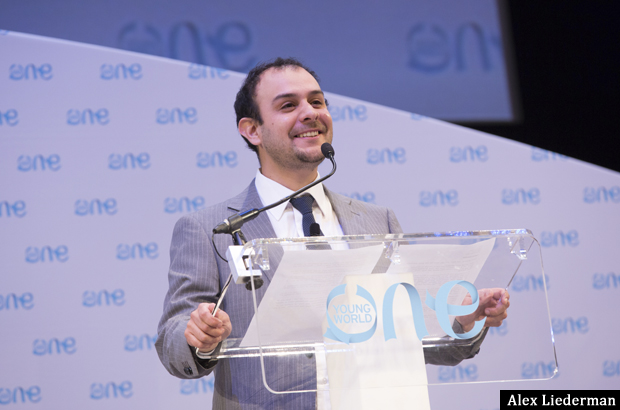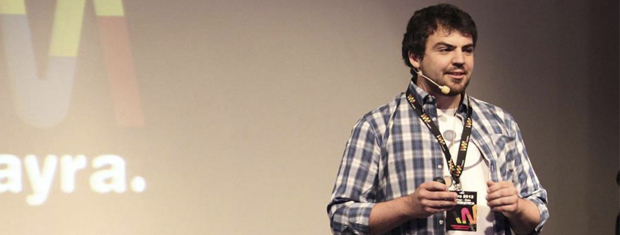Ambassador Carlos Aravena and José Manuel Sanchez discuss their social language-learning network, Políglota in an interview conducted by Ambassador Xenia Elsaesser.
Follow Políglota on Twitter: @Poligloton
It's Tuesday evening in Santiago, Chile, and Claudia sets off for a drink after work. She arrives at the table and introduces herself to the group. In English. Now, Claudia’s having a drink with 12 other people, hanging out and conversing in a language that is only spoken by 2% of the Chilean population.
This group meets every Tuesday to collaborate and have fun in a bar, practicing English for free.
Políglota is the first face-to-face, social language-learning network in the world. Its exponential growth and innovative business model are testimony to the trends found by the Global Millennial Survey. Whilst entrepreneurship is “very important” to 22% of Millennials globally, it is very important to 52% of Latin Americans. Specifically in Chile, 59% of Millennials are optimistic about the future (as opposed to 38% globally), and if Poliglota’s success is anything to go by, they have reason to be. Since 2010, when six Chileans first met to practice Italian, it has grown to more than 68,000 language-learners, meeting on a weekly basis across 150 cities in four continents. Its young founders, José Manuel Sanchez and Carlos Aravena, are currently being nominated for inclusion in the Forbes 30 under 30 list in the Education category, an accolade that comes a few weeks after Carlos became the first ever Chilean to speak at the One Young World Summit in Johannesburg, South Africa.
[[[image-0 native]]]
(Above: Carlos Aravena speaking at this year's Summit in Johannesburg, South Africa)
Carlos and José Manuel, both from small towns, met when they came to the Chilean capital to study. Both of them already knew they wanted to be entrepreneurs, and quit university early in order to found their start-up. I speak with the jovial pair over a pixelated Skype connection, and a large inverted map on the back-wall catches my eye. Carlos says that this is because they wanted to put Latin America on top, a sentiment which comes across strongly in their interview.
Where did you get your entrepreneurial drive from?
José Manuel: I co-founded a Chilean kind of boy-scouts movement when I was 18, and this made me I realise how rewarding it was to create things that changed society, and that I wasn’t going to be able to do it alone. To have great impact you have to collaborate with others.
Carlos: My father is an entrepreneur and in Chile young people have an increasingly entrepreneurial spirit. For my generation it’s not an aspiration to be an employee: we want to create things. The Chilean government is doing a lot to encourage entrepreneurship, and it helps that the Latin American economy is stabilising.
José Manuel: I’d be a bit more romantic about it. I think it’s also to do with the fact that we’re a nation founded by a powerful mix of indigenous people and explorers. We’re people that want to follow a dream.
Carlos: Yes, and it’s true that before, as an industrialised society, this spirit was suppressed. It’s only now that we’re going back to our roots as creators and collaborators.
José Manuel: I should also point out that for our generation it’s no longer about making money. That’s not enough. To be a real entrepreneur you have to be on a mission to change society, and that’s something we’re seeing increasingly in other young people today.
What inspired you to work in language learning? (Joint Answer)
It’s really important to us. We didn’t even speak fluent English at the time, and poor English remains one of the key competitive weaknesses of Latin America. More than half of the countries in the region are in the lowest band of proficiency. In Chile the public system does not put sufficient focus on English learning: aspiring students either have to travel abroad or take a private course. Both are expensive, inaccessible options.
How did the Políglota model come about? (Joint Answer)
At first we set up a more conventional structure that sold courses. We thought of having free language practice groups in the break time, but this was only a perk on the side. However, we soon realised that the break-time groups were much more successful than our first concept. We had six people meeting to learn Italian in week one, and by week two there were 50. This growth rate made us switch our focus.
Were there moments when you feared you would fail? (Joint Answer)
Yes, definitely, right at the beginning it was very hard. In Silicon Valley they say that the first people to fund your venture are the three Fs: family, friends and fools. Well, that’s not true in our case: no one believed in us! People didn’t understand how people practicing languages for free could be a business-model; they found it a very strange, quirky idea.
What was your first success? (Joint Answer)
Definitely getting in to Wayra, Telefónica’s start up incubation academy. We had hit rock-bottom: the groups were growing, but we were running out of funding. We had enough savings to last about another month, and we’d already left university, so there was no going back. Pitching the idea to Wayra was our last hope. We were incredibly nervous –there were 700 projects applying for ten places! But we put everything in to preparing a super presentation, and it went well. When no one else believed in us, Wayra did.
[[[image-1 native]]]
(Above: José Manuel Sanchez speaking at Wayra)
What have been the most rewarding moments? (Joint Answer)
Winning our place and accessing all the mentorship and funding on offer from the Wayra Academy was a huge high. But since then the most rewarding thing has been hearing about the impact we’re having on people’s lives around the world. For example, a Chilean women wrote to tell us that she fell in love at a Políglota group. She’d attended the group in Santiago to learn German, and met a young German man. Now they’re married and living in Germany.
Which languages are most important? (Joint Answer)
Overall 80% of our groups are practicing English. But in non-Spanish speaking countries (Brazil, the US and Europe) Spanish is gaining fast. In Latin America the traditional European languages like French, German and Italian come next in popularity, but there’s still quite a large gap. We’re also very diverse: we have groups doing sign language and indigenous languages like Aymara, for example.
What’s the dream for Políglota? (Joint Answer)
We want to create a bilingual Latin America. We dream of one Políglota group in every city of our continent. Whether it’s a big city or small village, we want everyone to have the chance to go to a bar or café to practice languages for free. Not only English, but any language.

